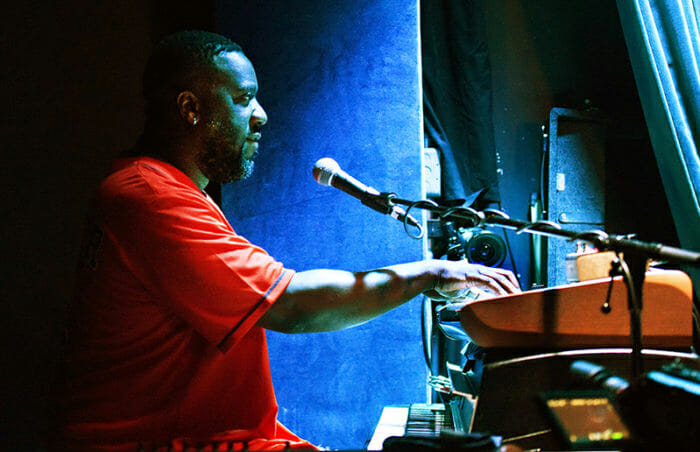Robert Glasper Makes Time for ‘Black Radio 3’

By Jeff Tamarkin. Photo by Dino Perrucci
***
Robert Glasper wasn’t planning to make Black Radio 3, the latest installment in the genre-obliterating series that began in 2012 with Black Radio, and the following year’s Black Radio 2. Although he had nabbed a Best R&B Album Grammy for the first release and a nomination in the same category for the sequel, he had since moved on to other things. But then popular demand intervened.
“I’ve always been asked about doing a Black Radio 3, but I didn’t want it to be like Rocky,” the keyboardist/ composer/producer says. “So I was always like, ‘Nah, it had its time.’ But then, during the pandemic, people really started asking for it.”
As with the earlier releases, on his new recording Glasper zeros in on the sweet spot where soul, hip-hop, funk and jazz meet. But, Glasper notes that his goal—in terms of the lyrical focus—was somewhat different this time around. “What I was trying to do was to not throw the pandemic and the police and the George Floyd thing back in the [listener’s] face in every song,” says the 43-year-old Texas native. “We get it. We know what happened. There are some songs, like ‘Black Superhero,’ that speak to some of that, but most of the other songs don’t. They speak more about love because a lot of people, I’ve realized, want the escape. They put on music to escape CNN and Instagram and Facebook and all those things where all you see is the negativity around us.”
As he did with the first two volumes, Glasper invited a long list of friends to contribute to Black Radio 3. The single “Better Than I Imagined,” featuring H.E.R. and Meshell Ndegeocello, preceded the release of the album and wound up landing Glasper yet another Grammy nomination, for Best R&B Song. “Shine,” the second single, boasts rapper D Smoke and singer Tiffany Gouché, while other tracks on the 13-song collection spotlight a diverse array of friends including Esperanza Spalding, Ledisi, Jennifer Hudson, Gregory Porter and Common. The album’s sole cover, Tears for Fears’ “Everybody Wants to Rule the World,” highlights vocalist Lalah Hathaway, who also appeared on the two previous volumes.
“When I’m working on Black Radio, I’m not interested in who’s the hot new artist at the time,” Glasper says. “It’s more about people who are open to pushing the music. I’m interested in, ‘Are you actually talented? Do you actually work on your craft?’ Black Radio has become a bar. If you’re on Black Radio, you have to be a certain thing. Who really has something to say?”
This time around, like so many other artists, Glasper was forced to assemble the album from pieces recorded remotely. In the past—the last Black Radio was made eight years ago, after all—Glasper would invite his various collaborators into the studio to lay down their parts. Not this time. “The first two [albums] I got done in one week apiece,” he says. “For this one, I would send the artists a song and, when they got to it, they got to it. Then, they’d send it back. It worked out because we had so much time. I’ve never had a whole year to do a record before.”
Fortunately, Glasper has been able to keep busy with other projects during this strange time. He’s been creating scores for TV programs, including a forthcoming reboot of The Fresh Prince of Bel-Air, the ‘90s sitcom that made a star of Will Smith. (This time, says Glasper, the show will take a more serious tone.) Glasper is also involved in the new HBO series Winning Time, which centers on the rise of basketball legend Magic Johnson and the L.A. Lakers of the ’80s.
And, as he’s done twice before, in 2018 and 2019 (skipping ’20 due to COVID), Glasper headlined a month-long residency at New York City’s Blue Note Jazz Club throughout October, extending into early November. The series—66 shows over 33 nights—has become so popular that it’s now unofficially called Robtober. For the 2021 run, as before, Glasper spotlighted different themes, working with a revolving cast of players. Audiences might get a night of Black Radio music, an acoustic jazz trio performance or something else altogether. Often, a show will sell out before Glasper has even announced the full list of participants.
“I start [by contacting] artists that I think would want to do it, including artists that don’t usually do small clubs,” he says. “It’s the Blue Note and it’s legendary, so a lot of people are itching to do it. Then I give the list to my manager and he goes to those artists and says, ‘Hey, we have this month. When are you free to do this?’” Sometimes an artist who happens to be in the city will drop by and end up onstage—comics Chris Rock and Dave Chappelle even turned up together one night last fall.
“It’s so unpredictable,” Glasper says. “You don’t know what the hell is going to happen. When Chappelle and Chris Rock came together, that was during my jazz-trio sets. There are some people [in the audience] who probably didn’t want to see a trio, who don’t even know what that is and don’t listen to jazz at all. But then they got Chappelle and Chris, and it’s like, ‘Oh, OK.’”
Following the release of Black Radio 3, Glasper will start thinking about his next project. Right now, he’s not sure what direction that might take. “I’m very open,” he says. “When I make records, the universe co-produces my albums.”




















